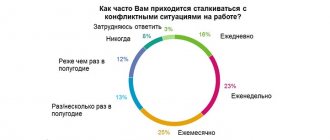A conflict of interest sometimes lies literally on the surface and is clearly visible to others. However, the most serious problems arise in cases where such a phenomenon is outwardly invisible. If it is not detected in time, it can ultimately greatly damage the reputation of a person or organization.
There are many real-life examples of conflicts of interest. For example, a man is the boss and his son works as his assistant. And even if the latter does his job brilliantly, people will never objectively evaluate such a situation.
What is a conflict of interest and how can it be detected? Let's try to understand this issue using specific examples.
Distribution area
Conflicts of interest are a ubiquitous phenomenon. Similar situations can arise in any area of life. Examples of conflicts of interest often occur between family members and classmates, among employees of the same organization, as well as in communities created by like-minded people. Moreover, their presence does not at all mean that people experience personal hostility towards each other. The most difficult areas in which conflicts of interest occur are the political and public sectors.
Definition of the concept
A similar phenomenon occurs in our lives quite often. It is simply impossible to hide a conflict of interest or quickly exhaust it. That is why a federal law appeared in Russia, which is called “On Combating Corruption.” This document interprets the concept of “conflict of interest” as a situation in which there is an indirect or direct personal interest of a municipal or government employee. At the same time, she is capable of influencing or is already influencing the performance of his official duties. As a rule, examples of conflicts of interest in the state and civil service relate to the receipt of material benefits by employees not only for themselves, but also for those third parties with whom there is a connection in the form of financial obligations.
In a 2009 report, Marilyn Field and Bernard Law pointed out that a conflict of interest is nothing more than a set of obligations that create risks that a secondary interest will directly influence professional actions or judgments regarding the primary interest. In other words, a similar phenomenon can occur in the case of existing personal benefit of a person who participates in the process of making a particular decision. This leads to damage to the interests of the company or society.
Let's look at some clear examples of conflicts of interest:
- A pharmaceutical company awards a research grant to a doctor. In this case, the specialist begins to feel obligated to prescribe medications from this particular manufacturer to his patients, despite the availability of better alternatives. In this case, damage to public interests is caused.
- A woman who is an employee of the company describes to the boss the merits of her nephew as a candidate for a vacant position. However, she does not mention her family ties with him.
- The boss gives the employee the task of finding a supplier for the company. He offers in response an organization in which he himself is the owner of shares.
- At the end of the year, the boss gives himself and his team impressive bonuses. Moreover, this is happening against the backdrop of the fact that the company’s owners are facing serious losses.
In most cases, such situations are not a violation of the law. This is why there are so many examples of conflicts of interest in any organization. But the existing problem will certainly call into question the employee’s reputation, reliability and honesty. In the future, this will negatively affect the work of the entire team.
What kind of situation is this
A conflict of interest is a situation in which an employee has a personal interest, and he begins to try to gain his benefit by any means, regardless of the fact that the result may lead to financial or any other losses in the company. In the labor law of the Russian Federation there is no definition of the concept of “conflict of interest”. This legal uncertainty often becomes the reason for the impossibility of solving this problem at the enterprise.
Concept and definition in psychology
In psychology, this concept has 2 varieties:
- Organizational;
- Personal.
For your information. An organizational conflict arises when an enterprise providing services to the Customer cannot objectively perform the work specified in the Service Agreement due, for example, to competitive advantages.
The definition of a personal conflict can be understood as a situation where the personal interests of an employee contradict the labor legislation of the Russian Federation, for example, when receiving financial benefits. Most often the law “On Corruption” is violated. There are no pedagogical laws for solving and regulating this process, unlike the previous type.
Personal gain
Disagreements regarding conflicts of interest
Disagreements in conflicts of interest usually arise. Although this depends on several factors:
- personality type of the participant in the conflict of interest;
- civility and competence of the participants in the situation;
- relationships between employees.
Personal Interest
Self-interest is often present in disagreements. Personal interest involves obtaining financial benefit. Most often, this situation arises between relatives working at the same enterprise. The anti-corruption law should spell out this situation and ways to solve it. This concept is also mentioned in Article 19 of the Federal Law “On Civil and State Service”.
Personal Interest
Signs and forms
The word "conflict" comes to us from Latin. Translated from this language, it means nothing more than “collision.” That is, a certain point comes when two or more members of a community or group begin to make claims on the same object. This leads to the intersection of the areas of interest of all those who are related to this situation.
Conflicts of interest are divided into personal and organizational. In the first case, the performance of official duties by a person comes into clear conflict with his own desires. Examples of conflicts of interest in the service sometimes concern, for example, a situation where, despite the fact that the task will not be completed on time, the employee wants to go home either at the end of the working day or earlier. After all, he has his own plans for the evening.
In the event of an organizational conflict, an entire private enterprise stands up to defend its benefits. In this case, the company takes into account only its own interests and tries to refuse or refuses to cooperate with the state, becoming unable to provide its services impartially. Responsibility for such a situation rests entirely with the manager, because such actions will certainly cause damage to the company as a whole. If damage is caused to structures supported by the state, then in this case the current legislation may come into force.
Similar situations arise in cases where the object of the conflict cannot be divided between the two parties laying claim to it. At the same time, no one wants to make concessions or seek compromises.
Conflict resolution
Article number 11 of the federal law, which provides for combating corruption, identifies two subjects of settlement, as well as the prevention of conflicts of interest. One of them is a municipal (civil) employee. The second subject is the employer's representative.
In this regard, municipal and civil servants are vested, according to the law, with two main responsibilities. First of all, they need to take measures to help prevent any situations in which a negative phenomenon may occur. In addition, they must write a conflict of interest notice, an example of which is given below, to their immediate superior. Such a document should indicate not only the existing situation, but also the possibility of its occurrence. Moreover, a civil servant is obliged to take such a step already when he becomes aware of it.
To prevent a conflict of interest, this government representative should not maintain contacts with organizations whose activities are in an area that intersects with his official responsibilities. This does not apply to cases where he is obliged to perform such work.
As for notification of the likely occurrence of a conflict of interest in writing, the degree of personal benefit of an employee, according to current legislation, should be determined only by the official himself. His failure to take measures to resolve such a problem entails his dismissal.
Sample notification
How should a civil servant prevent the possibility of a personal problem arising in resolving a particular issue? To do this, he will need to write a notice of conflict of interest, an example of which can be filled out below.
The document must be drawn up in the name of the boss. The following is its title: “Notice of Conflict of Interest.” The text of the document indicates the last name, first name and patronymic of the civil servant, as well as his position. After this, a situation is described that provokes the possibility that a conflict of interest may arise. For example, it may concern the conclusion by an organization of contracts with a supplier company, headed by a close relative of the official. This is followed by the employee’s agreement or disagreement to be present during a meeting of the commission created to resolve this conflict of interest. At the bottom of the notification is the signature of the person who wrote it, as well as his full name and the date the document was compiled.
Let's consider typical situations and examples of conflicts of interest in the Russian civil service.
How to prevent and resolve conflict
Examples of conflict situations, their description and resolution.
There are ways to prevent and resolve conflicts of interest. There are quite a few of them, all of them are supported by the laws of the Russian Federation. A person who knows about a conflict of interest, but does not have the opportunity to resolve this situation, and at the same time does not report it to senior management, also bears responsibility, sometimes not only administrative. There are no such situations that can be regulated independently.
First of all, it should be understood that, despite a clear mechanism of action in the process of conflict resolution, the behavior of the participants in a given situation is not always predictable. Therefore, emergency situations often arise, which it is recommended that professionals, both in the legal and political fields, understand:
- The very first measure to prevent conflict is complete transparency of the transaction. It should be clear where the goods were purchased, what their cost was, what resources were spent on certain works, what companies they collaborated with, and whether there are any tax pitfalls among them, etc.
- There should be ongoing analysis of the organization. It can be done by a specially hired employee, or it can be done directly by the head of the enterprise.
- It is recommended to control the process of hiring employees so that among them there are no people who are in close family relationships.
- Introduce into the regulatory documents of the enterprise a ban on receiving gifts, financial assistance and various other benefits.
- The enterprise must have a Code of Ethics, which should be familiarized to all employees.
- If, when concluding an agreement or a controversial situation arises, there are persons present who are biased towards what is happening, they must be removed while the conflict is resolved.
- A civil servant does not have to maintain all the assets of an enterprise.
Fighting methods
Relationships with relatives
There are examples and situations of conflict of interest in the public service in the event of an official’s personal benefit. Thus, an employee can be directly involved in resolving personnel issues regarding his relatives. In addition to close people, we can also consider other persons in respect of whom the civil servant is likely to receive benefits. Let's look at examples of conflicts of interest in municipal service:
- An employee of a government agency is part of a competition commission that considers candidates for a vacant position in his institution. One of the contenders is his relative.
- The duties of a civil servant include the implementation of certain managerial functions or issues of making personnel decisions concerning relatives or other persons close to him.
- In such cases, it is mandatory to write a notice about the likelihood of a conflict of interest. In this regard, the employer's representative must remove such an employee from those duties that involve his interaction with close people.
Conflict of interest in public service
A sign of a real conflict of interest appears in a situation where a person works in the personnel department of a state-owned enterprise and recruits his relatives or the relatives of someone working at this enterprise for the purpose of obtaining financial benefits.
Other examples:
- A civil servant is an intermediary in the provision of services or performance of work between companies in which his close relatives work. At the same time, in relation to the company that sells these services, separate functions of public administration are used.
- A civil servant provides paid services to the state organization in which he serves.
- A civil servant participates in a tender for the purchase of goods from a company whose director is a close relative.
- A civil servant participates, using the functions of public administration, in performing work for banking structures in which he has savings.
In life, no one is immune from participation, direct or indirect, in a conflict of interest. The most important points remain an objective assessment of your actions and knowledge of the legislation of the Russian Federation.
Performing other work subject to payment
An example of a conflict of interest in the public service is a situation when an official, as well as his relatives or other persons close to him, are going to perform or are already performing work for the organization where this employee works, under the terms of a paid civil law or other contract.
In this case, a notice of conflict of interest must also be drawn up. But at the same time, the employer’s representative does not have the right to indicate the impossibility of performing other work by this official.
An example of a conflict of interest in the public service is a situation where an employee, together with his relatives or other persons with whom beneficial interaction is carried out, performs work in a subsidiary, parent or other similar company in relation to which these employees perform managerial functions.
And in this case, a notification must be drawn up to the employer’s representative. In it, the civil servant must indicate the connections that take place between interacting organizations. The employer's representative, in accordance with the law, is recommended to remove the employee from fulfilling his duties in making management decisions in relation to the affiliated company.
An example of a conflict of interest in the civil service can be seen in a slightly different situation. It concerns the performance of work, the customer of which is the body in which the person holds a position. The employer's representative in this case must indicate the emergence of a conflict of interest. If a person does not take any measures to correct the problem, then he should be removed from the position he is replacing.
If the matter involves interaction with employers from the previous place of work
The first case that can be considered within the framework of this issue is if management functions are being exercised in relation to a certain enterprise or organization where the person in question previously held a managerial or other position.
In this case, the employer notifies his superiors and the superiors of that organization, and then the employer conducts a thorough check, as a result of which it is determined whether there is a possibility that certain relationships of the employee with colleagues, management or other persons from previous work could in any way affect on the performance of its activities - in other words, whether such a conflict will take place. Of course, if there is such a possibility, and it is quite high, then, as in the cases described above, the best option would be to remove the employee from work related to this organization.
Let us also imagine that a certain employee is at the stage of discussing employment, after completing his civil service in one organization, in another place with which he could also have a similar relationship. Here, too, the only reasonable solution would be to completely abstain from applying for a job in such an organization until the final dismissal from the civil service takes place - this will help to avoid any misunderstandings and CIs. In the case where negotiations are already underway, you must also notify your management and employer that there is a possibility of personal interest.
It is not recommended to get a job in an organization with which the former civil servant had cooperation as part of his work
It is important to realize that in this situation, CI can damage the reputation of a government agency, but cannot be regulated in any way by law.
For example, an employee held a leadership position in the healthcare sector, and then moved to a private clinic that had direct interaction in the area where this employee previously held his position. Or an employee can independently become the founder of an organization, as a result of whose activities he will regularly communicate with his previous employer - the government agency where he previously worked.
The third similar example is related to project work during civil service and the subsequent implementation of these projects after the dismissal occurred.
You need to completely end your employment relationship with the civil service body in order to get a new job
Ownership of certain securities
Let's consider other cases of conflict of interest. Examples in the service of state or municipal bodies may relate to the ownership by an employee and/or his relatives of securities belonging to this organization. This must also be notified in writing. In this case, the securities must be transferred to trust management. In addition, the issue of their alienation may be considered.
Examples of conflicts of interest may also relate to situations where a civil servant has deposits in banks or other credit institutions in relation to which he exercises managerial functions. In this case, you will also need to write a notice of personal interest addressed to your immediate superior. Until the necessary measures are taken, the employee must be suspended from performing those official duties that relate to working with banks and credit organizations.
Receiving services and gifts
It is also possible that a civil servant or his relatives receive various benefits. These could be discounts and loans, free services, payment of travel expenses, entertainment, etc.
Such gifts, if they are provided by organizations or individuals in relation to which the civil servant currently exercises or previously exercised managerial functions, are subject to a growing conflict of interest. To avoid such a situation, it is recommended to simply not accept these benefits. If the employer’s representative becomes aware of the receipt of gifts by a civil servant, he must assess the connection of what was received with the performance of the official duties assigned to the employee, and, if necessary, take disciplinary action.
Main reasons
Interpersonal conflict - what is it in psychology
? Disagreements can arise for various reasons. There are so many of them that it is impossible to list them all. The most potential ones include:
- Along with the received order, there is an opportunity to perform additional work or provide services for which an additional fee is charged;
- Personal interest may arise when owning enterprise assets, securities, etc.;
- The situation may arise when receiving gifts for services rendered or financial “thanks”;
- The situation often arises during litigation, during the division of property, etc.;
- Provision of services by former employees of government or other structures;
- Exceeding official authority;
- Providing services for carrying out various works to people who are related to government officials, without concluding a contract, out of turn, with a reduced cost of goods, etc.;
- Failure to comply with job instructions or violation of official duties during the implementation of the subject of the Agreement;
- Failure to comply with the law by civil servants, violation of the rights of individual citizens;
- Conducting public tenders with companies whose directors are close relatives of government employees. Such tenders are held for the purpose of “laundering” money and opening new financial flows, which may not be subject to taxes;
- Unauthorized assistance in resolving any issue for which a fee is charged.
Main reasons for disagreement
The sphere of education
In addition to public service, examples of conflicts of interest can be given in school. This applies to situations where a teacher, in parallel with his work activities, provides paid services.
The legislator seeks to combat such a situation when a teacher teaches a student who is studying at the school that is the place of work of this teacher. As a result of such actions, a conflict of interests arises in education. Examples of the provision of such paid services can be found everywhere. At the same time, some teachers artificially create situations in which the children’s parents or their legal representatives are forced to agree to the provision of tutoring imposed on them. Sometimes colleagues “supply” such students to each other. At the same time, they use the principle “you - to me, and I - to you.”
It is worth understanding that the law does not prohibit the provision of paid educational services. They can be provided by the school on a contractual basis. In this case, the teacher who conducts a regular lesson with the child, according to the curriculum, may well provide paid services. That is, this can be done legally only by being a representative of the contractor when concluding contractual obligations.
In what cases do the services provided by a teacher violate the norms of current legislation? This happens when the following conditions are met:
- the service provided by the teacher is informal and paid;
- the student is studying in the educational organization where the tutor works;
- the provision of a paid service becomes the cause of a conflict of interest for the teacher.
If all the above conditions are met, additional training does not comply with legal requirements and is prohibited. This also applies to those cases when the teacher does not teach a particular student. Indeed, in this case it is impossible to prove the absence of collusion among teaching staff.
A conflict of interest in the field of education is the contradiction that arises between professional responsibilities and a person’s personal benefit. After all, upon arriving at school, a teacher is faced with the possibility of acquiring material or intangible benefits. This is the reason for his failure to fulfill his professional duties or their improper performance.










